Technology’s quick development is causing an unexpected change in the retail sector. One of the most groundbreaking innovations is Conversational AI in retail. By enabling real-time, human-like interactions, conversational AI has transformed how retailers engage with customers.
This blog explores why conversational AI is revolutionizing the retail landscape, its benefits, practical use cases, and a glimpse into its future potential.
Why Conversational AI is Transforming Retail
Conversational AI in retail plays a transformative role by bridging the gap between traditional customer service methods and modern consumer demands. It empowers retailers to deliver smarter, more engaging, and efficient customer experiences.
The growing need for smarter customer engagement tools
Shoppers today expect more—they want quick, effortless, and personalized experiences across all platforms. Traditional tools struggle to meet these demands, leading to lost opportunities. Conversational AI steps in as a smarter solution, helping retailers engage better, respond faster, and create a consistent customer journey while saving time and resources.
Key statistics highlighting its adoption and success in retail
Benefits of Conversational AI in Retail
From improving efficiency to providing personalized experiences, it helps retailers stay competitive in an increasingly digital world. Let’s explore how conversational AI in retail delivers measurable benefits that enhance both operations and customer satisfaction.
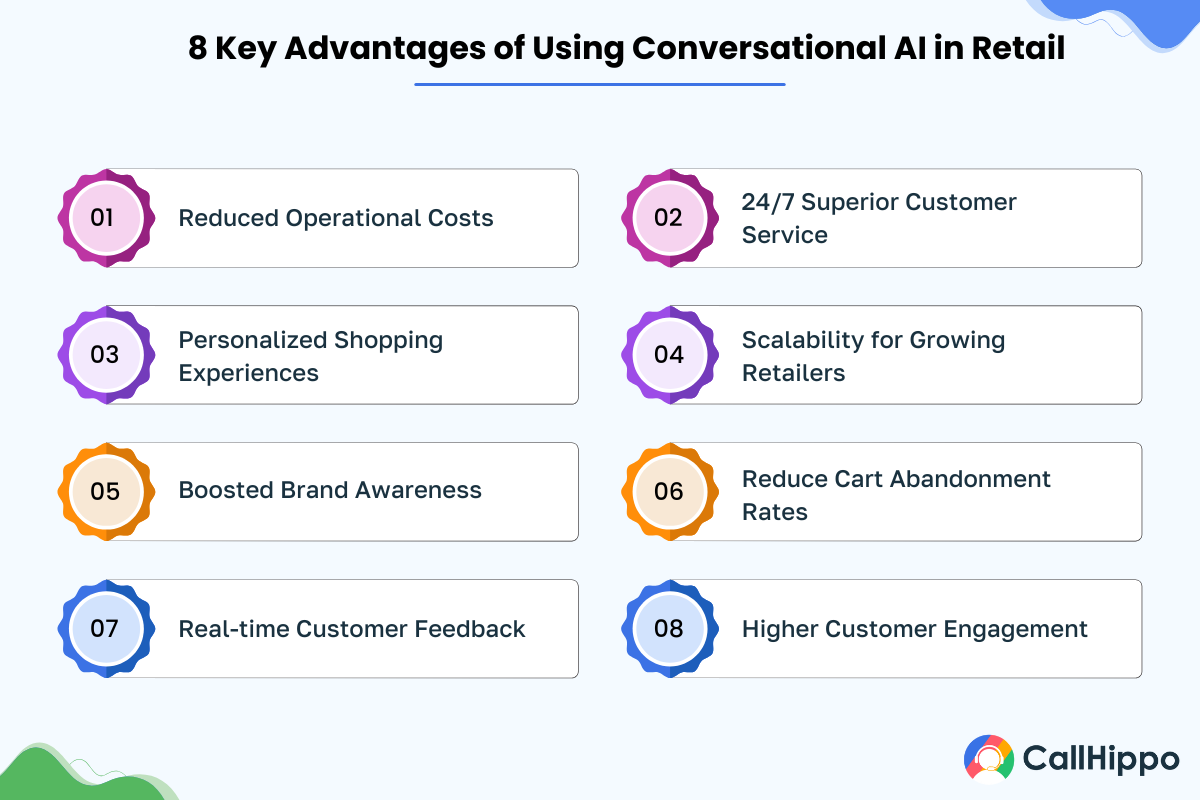
1. Reduced Operational Costs
Conversational AI streamlines operations by automating repetitive tasks like answering FAQs, processing order inquiries, and tracking shipments. This reduces the need for large customer support teams, saving retailers significant costs.
For example, a chatbot can handle hundreds of inquiries simultaneously, freeing human agents to focus on complex issues. With lower staffing requirements and faster resolutions, businesses can redirect their resources toward growth initiatives, ensuring better productivity and profitability.
2. 24/7 Superior Customer Service
Unlike human agents, conversational AI works around the clock, offering instant support to customers regardless of time zones. Whether it’s answering product questions or solving order issues, customers get the help they need immediately.
This ensures a seamless shopping experience, boosting customer satisfaction and loyalty. For instance, an online store can rely on AI to resolve after-hours queries, ensuring no opportunity for engagement is lost.
3. Personalized Shopping Experiences
Conversational AI enhances the shopping experience by using data to make tailored recommendations based on customer preferences and browsing history. This personalization makes customers feel valued, encouraging repeat purchases and increasing overall satisfaction.
Some businesses utilizing AI for personalized recommendations have reported conversion rate improvements of up to 915%.
For instance, a chatbot can suggest products that match a customer’s style or remind them of previously viewed items, making the shopping journey more enjoyable and convenient.
4. Scalability for Growing Retailers
As businesses grow, managing customer interactions becomes challenging. Conversational AI easily scales to handle high volumes of customer inquiries without compromising service quality.
Whether it’s a sudden spike during a sale or managing multiple channels simultaneously, AI-powered tools ensure consistent support. This scalability makes it a perfect solution for retailers looking to expand while maintaining a high standard of customer service.
5. Boosted Brand Awareness
Conversational AI helps businesses stand out by delivering consistent and engaging interactions. Customers associate the positive experience with the brand, creating lasting impressions.
For example, AI-driven tools can engage users with personalized messages and exclusive offers, making the brand memorable in a crowded marketplace. This helps retailers build stronger relationships and drive brand loyalty.
6. Reduce Cart Abandonment Rates
Cart abandonment is a common issue for online retailers, but conversational AI can address this by sending timely reminders and resolving customer concerns instantly. Whether it’s clarifying product details or providing discounts, AI tools can guide customers in completing their purchases. This proactive approach helps retailers recover lost sales and boost their revenue.
7. Real-time Customer Feedback
Conversational AI seamlessly collects feedback during interactions, giving retailers actionable insights to improve products and services. For example, a chatbot can ask customers about their shopping experience after completing a purchase or suggest improvements based on their responses.
This continuous feedback loop allows businesses to adapt to customer preferences quickly and stay ahead in the competitive retail space.
Platforms like Qualtrics leverage AI to gather actionable feedback during interactions, making real-time adjustments possible.
8. Higher Customer Engagement
With features like live chats, personalized product suggestions, and interactive elements, conversational AI keeps customers engaged for longer periods. This improved engagement enhances the overall shopping experience and increases the likelihood of conversions.
For example, a chatbot that offers style advice or product comparisons creates a dynamic and enjoyable interaction, encouraging customers to explore more and build trust in the brand.
CallHippo AI Sales Agent: Your Partner in Retail Transformation
The CallHippo AI Sales Agent is designed to make customer interactions faster, easier, and more personalized for retail businesses. It uses conversational AI to handle routine tasks like answering FAQs, tracking orders, and assisting customers 24/7.
This smart tool doesn’t just save time—it also creates better shopping experiences by offering personalized recommendations and seamless support. With CallHippo’s AI Sales Agent, retailers can focus on growing their business while ensuring every customer feels valued and attended to. It’s a simple, effective way to transform how you connect with shoppers and keep them returning for more.
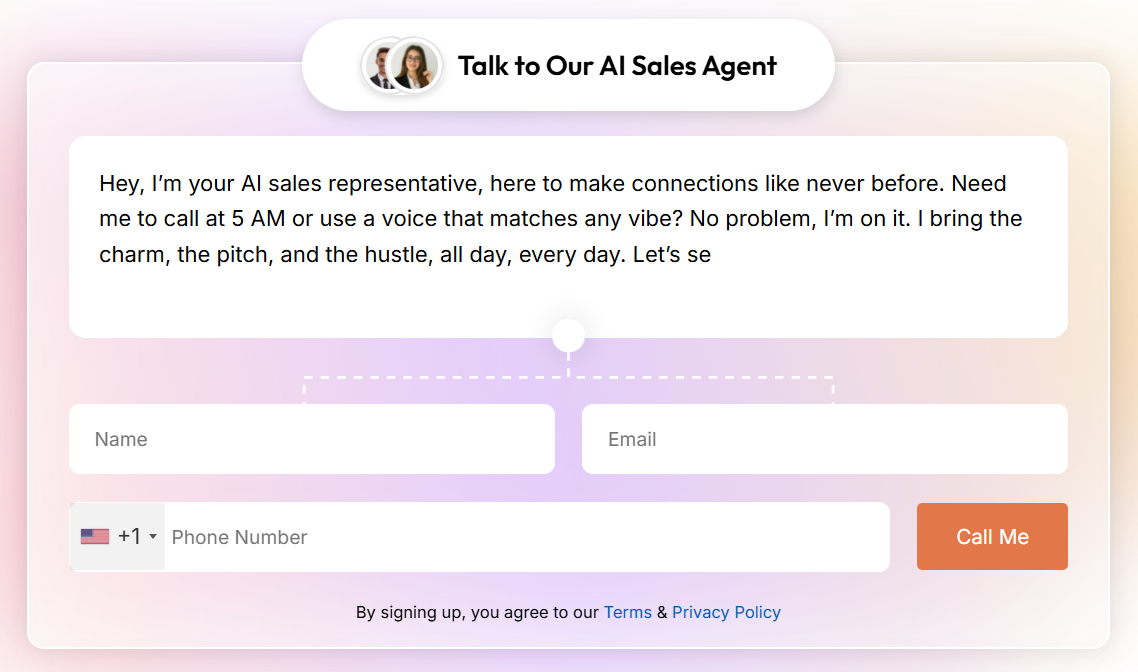
Why CallHippo AI Sales Agent?
The CallHippo AI Sales Agent is packed with powerful features that make it an essential tool for retail businesses. From automating repetitive tasks to providing round-the-clock customer support, it ensures seamless shopping experiences. These features not only enhance customer satisfaction but also streamline operations, helping retailers save time and money.
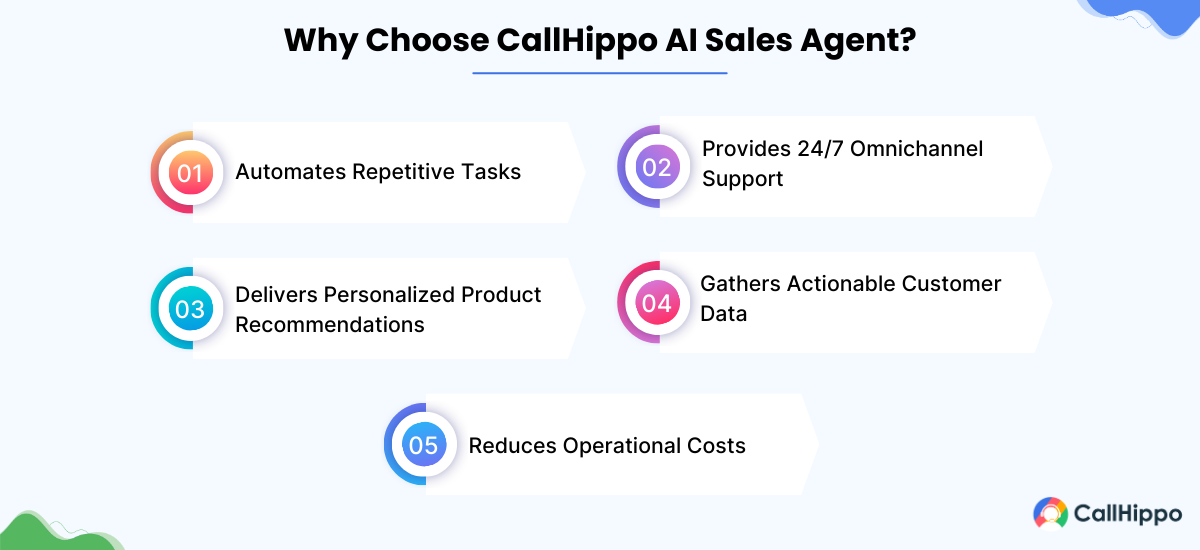
1. Automates Repetitive Tasks
The AI Sales Agent simplifies operations by automating tasks like answering common customer questions and tracking orders. For example, instead of requiring human agents to respond to repetitive queries about delivery times or return policies, the AI handles these inquiries instantly. This frees up staff to focus on complex customer needs.
By automating these processes, businesses can improve efficiency while maintaining high service standards, creating a better experience for customers and reducing workloads for employees.
2. Provides 24/7 Omnichannel Support for Seamless Customer Experiences
CallHippo’s AI Sales Agent is available around the clock to support customers, no matter when or where they shop. It integrates with multiple platforms—websites, social media, and messaging apps—ensuring consistent communication across all touchpoints.
Whether it’s resolving issues after business hours or assisting customers on their preferred channels, the AI ensures a smooth experience. This 24/7 omnichannel support builds trust and loyalty, as customers know they can always rely on the business for help.
3. Delivers Personalized Product Recommendations to Enhance Shopping Journeys
Using customer data, the AI Sales Agent tailors shopping experiences by suggesting products that align with individual preferences. For instance, it can recommend accessories to complement a recent purchase or highlight items based on browsing history.
These personalized interactions make customers feel understood and valued, increasing the chances of repeat purchases. By making relevant suggestions, retailers can boost sales while offering a more enjoyable and engaging shopping journey.
4. Gathers Actionable Customer Data for Better Decision-Making
The AI collects valuable insights during every customer interaction, such as buying patterns, preferences, and feedback. This data helps retailers make informed decisions about inventory, marketing strategies, and customer outreach.
For example, if customers frequently ask about a specific product, the business can stock more of it or create targeted promotions. By leveraging these insights, businesses can align their strategies with customer needs and stay ahead in a competitive market.
5. Reduces Operational Costs While Improving Customer Satisfaction
With its ability to handle large volumes of inquiries without human intervention, the AI Sales Agent helps businesses cut operational costs significantly. Tasks that previously required multiple employees can now be managed by AI, allowing retailers to allocate resources more effectively.
Despite the cost savings, service quality doesn’t drop—in fact, it improves as customers receive faster responses and personalized support. This combination of efficiency and satisfaction makes the AI Sales Agent a smart investment for any retail business.
Boost Your Sales Pipeline with
AI Sales Agent by CallHippo
- Automated Lead Qualification
- 24/7 AI-Powered Engagement
- Seamless CRM Integration

How Retailers Can Leverage Conversational AI?
Retailers can unlock a world of potential by leveraging conversational AI to enhance customer experiences and streamline operations. Here’s how retailers can use conversational AI to thrive in their business.
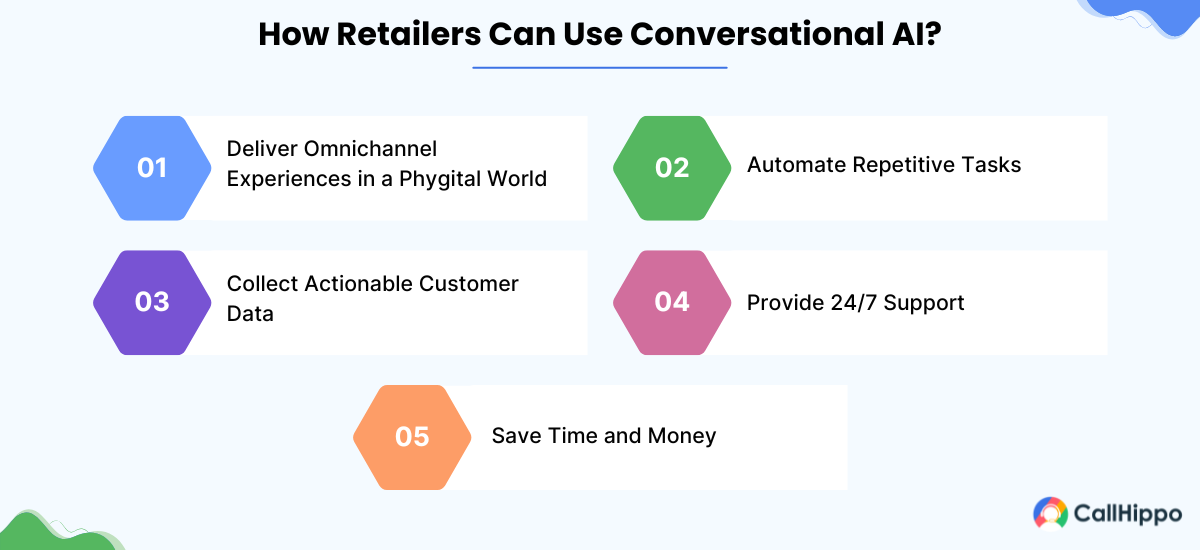
1. Deliver Omnichannel Experiences in a Phygital World
Today’s consumers expect seamless interactions between physical and digital shopping experiences, known as “phygital” retail. Conversational AI helps retailers deliver consistent and personalized experiences across all channels—whether it’s online, in-store, or via mobile apps.
By integrating AI with different platforms, retailers ensure that customers receive the same level of support and information regardless of where they interact with the brand. This creates a smoother, more unified customer journey and boosts brand loyalty. In the phygital world, AI ensures that customers enjoy a personalized experience, regardless of the medium they choose.
2. Automate Repetitive Tasks
Conversational AI takes over repetitive tasks like answering common questions, order status updates, and processing returns, freeing up human agents for more complex issues. By automating these tasks, retailers can handle a higher volume of inquiries without increasing their workforce.
For example, an AI-powered chatbot can instantly respond to a customer’s question about delivery timelines or product availability, saving time for both the customer and the business. This automation reduces operational costs and improves efficiency, ensuring that customers receive quick, consistent service every time they interact with the brand.
3. Collect Actionable Customer Data
Conversational AI collects valuable data during interactions, offering insights into customer preferences, behavior, and pain points. By analyzing this data, retailers can make better decisions about product offerings, marketing campaigns, and customer service strategies.
For example, if customers frequently inquire about certain features of a product, businesses can highlight those features in future marketing materials. Additionally, AI helps segment customers based on their preferences, enabling businesses to create tailored promotions and campaigns that resonate with specific groups. By using actionable data, retailers can improve their products and stay competitive.
4. Provide 24/7 Support
One of the key advantages of conversational AI is its ability to provide 24/7 support. Whether customers are shopping during the day or late at night, AI is always available to answer questions, resolve issues, and provide assistance. This means customers no longer have to wait for business hours to get help, ensuring their needs are met promptly.
For retailers, this not only enhances the customer experience but also leads to increased customer loyalty. Round-the-clock availability ensures that customers can shop, inquire, or solve problems at their convenience, regardless of time or location.
5. Save Time and Money
After automating tasks, providing instant responses, and reducing the need for a large customer support team, conversational AI helps retailers save both time and money. Instead of having to manage a high volume of inquiries with human agents, AI handles routine tasks, allowing businesses to focus resources on more strategic areas.
For example, an AI chatbot can handle hundreds of inquiries simultaneously, providing accurate answers in real time. This improves efficiency and reduces operational costs while maintaining a high level of service, making conversational AI an invaluable tool for modern retail businesses looking to scale.
Use Cases of Conversational AI in Retail
From personalized recommendations to real-time order updates, these AI-powered tools provide valuable services that improve both customer satisfaction and business efficiency. Here’s how conversational AI is being used in retail today.
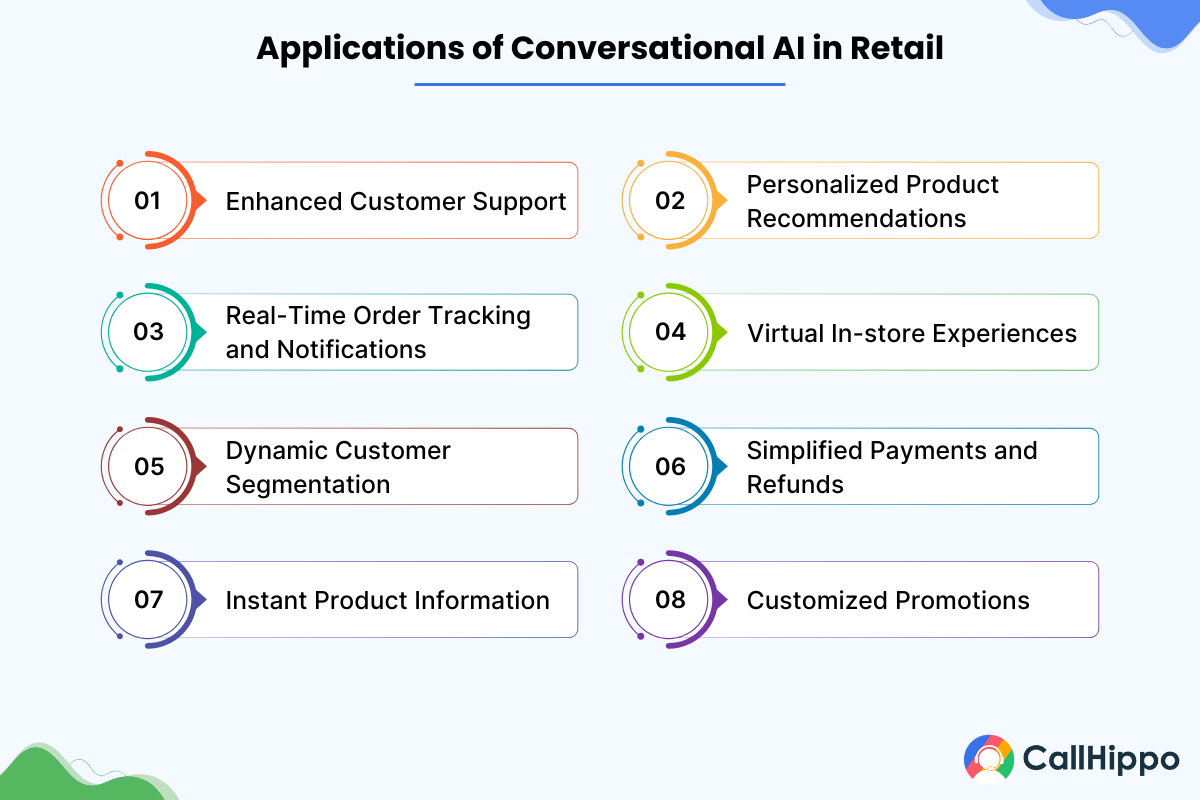
1. Enhanced Customer Support
Conversational AI ensures that customers receive quick, accurate answers to their queries, enhancing support efficiency. Whether through chatbots or voice assistants, AI provides immediate responses to frequently asked questions or issues, reducing wait times. This 24/7 availability leads to higher customer satisfaction as customers feel supported, even outside business hours.
2. Personalized Product Recommendations
AI-powered tools analyze customers’ browsing and purchasing behavior to recommend products that align with their preferences. By suggesting items that customers are more likely to be interested in, conversational AI boosts the chances of converting a casual browser into a buyer. These tailored suggestions make the shopping experience more engaging and increase the likelihood of repeat purchases.
3. Real-Time Order Tracking and Notifications
Conversational AI provides real-time updates on order status, ensuring customers are informed throughout their journey. Whether it’s a shipping update or a delivery alert, AI helps reduce anxiety by keeping customers in the loop. This transparency enhances the overall shopping experience, helping to build trust and satisfaction among customers.
4. Virtual In-store Experiences
AI-powered virtual assistants simulate the in-store experience by guiding customers through product choices and providing personalized advice. These virtual assistants can answer questions, offer product comparisons, and even recommend accessories or complementary items, just like a human store assistant would. This enhances the online shopping experience, replicating the helpfulness of physical stores.
5. Dynamic Customer Segmentation
Conversational AI segments customers based on their behaviors, preferences, and past interactions, enabling retailers to target their marketing efforts more effectively. By understanding different customer segments, businesses can tailor their messaging, product offerings, and promotions to appeal to each group, improving customer engagement and increasing conversion rates.
6. Simplified Payments and Refunds
Conversational AI streamlines payment and refund processes, offering instant support for customers. AI can guide customers through the checkout process, answer payment-related queries, and handle refund requests quickly. This makes the shopping experience smoother, reducing friction in the transaction process and enhancing customer satisfaction by resolving issues efficiently.
7. Instant Product Information
With conversational AI, customers can access detailed information about products instantly. Whether they need to know the availability, features, or pricing, AI tools provide real-time responses. This eliminates the need for customers to search for information manually and empowers them to make informed purchase decisions without waiting for assistance.
8. Customized Promotions
AI tools analyze customer data to craft personalized promotions tailored to individual preferences. By understanding shopping habits and browsing history, AI delivers targeted discounts and offers that appeal to customers on a personal level. This helps retailers increase sales by providing relevant promotions that encourage customers to make a purchase.
Future of Conversational AI in Retail
The future of conversational retail looks promising with innovations like voice commerce, AI-driven loyalty programs, and advanced customer behavior analysis. Retailers can expect virtual stores, hyper-personalized shopping experiences, and AI-powered voice assistants to become mainstream.
By 2030, the conversational AI market is expected to grow to $49.9 billion, with retail as one of the leading industries driving this growth.
These advancements will redefine customer engagement and further cement the role of retail conversational AI in the industry.
Conclusion
Conversational AI is no longer just an added advantage; It is becoming essential for retailers hoping to prosper in an increasingly competitive marketplace. From improving customer support to delivering personalized shopping experiences, the applications of conversational AI in retail are limitless.
With CallHippo’s AI Sales Agent leading the charge, retailers can embrace this technology to enhance customer satisfaction, boost sales, and achieve sustainable growth.
FAQs
1. How is AI used in retail stores?
AI is used for tasks like personalized product recommendations, customer support automation, inventory management, and real-time order tracking to enhance the retail experience.
2. What are the top AI trends in retail?
Emerging trends include voice commerce, virtual shopping assistants, hyper-personalized marketing, and dynamic customer segmentation.
3. Can AI completely replace traditional retail methods?
AI complements traditional retail methods by enhancing customer engagement and operational efficiency but doesn’t completely replace them.
4. How does AI enhance the customer experience in retail?
AI enables personalized interactions, 24/7 support, real-time updates, and tailored promotions, significantly improving the customer experience.
5. How is AI transforming retail banking for customers?
In retail banking, AI simplifies processes like loan applications, fraud detection, and personalized financial advice, offering a seamless customer experience.

Let’s Stay in Touch
Subscribe to our newsletter & never miss our latest news and promotions.



